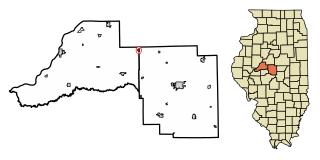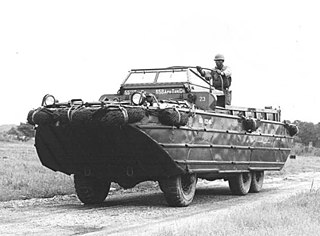
Page County is a county located in the U.S. state of Iowa. As of the 2020 census, the population was 15,211. The county seat is Clarinda. The county is named in honor of Captain John Page of the 4th U.S. Infantry, who was mortally wounded in the Battle of Palo Alto.

San Jose is a village in Logan and Mason counties, Illinois, United States, founded in 1858. The population was 479 at the 2020 census, down from 642 in 2010.
Buck v. Bell, 274 U.S. 200 (1927), is a decision of the United States Supreme Court, written by Justice Oliver Wendell Holmes, Jr., in which the Court ruled that a state statute permitting compulsory sterilization of the unfit, including the intellectually disabled, "for the protection and health of the state" did not violate the Due Process Clause of the Fourteenth Amendment to the United States Constitution. Despite the changing attitudes in the coming decades regarding sterilization, the Supreme Court has never expressly overturned Buck v. Bell. It is widely believed to have been weakened by Skinner v. Oklahoma, 316 U.S. 535 (1942), which involved compulsory sterilization of male habitual criminals. Legal scholar and Holmes biographer G. Edward White, in fact, wrote, "the Supreme Court has distinguished the case [Buck v. Bell] out of existence". In addition, federal statutes, including the Rehabilitation Act of 1973 and the Americans with Disabilities Act of 1990, provide protections for people with disabilities, defined as both physical and mental impairments.
Skinner v. State of Oklahoma, ex rel. Williamson, 316 U.S. 535 (1942), is a unanimous United States Supreme Court ruling that held that laws permitting the compulsory sterilization of criminals are unconstitutional as it violates a person's rights given under the 14th Amendment of the United States Constitution, specifically the Equal Protection Clause and the Due Process Clause. The relevant Oklahoma law applied to "habitual criminals" but excluded white-collar crimes from carrying sterilization penalties.

The DUKW is a six-wheel-drive amphibious modification of the 2+1⁄2-ton CCKW trucks used by the U.S. military during World War II and the Korean War.
United States v. Carolene Products Company, 304 U.S. 144 (1938), was a case of the United States Supreme Court that upheld the federal government's power to prohibit filled milk from being shipped in interstate commerce. In his majority opinion for the Court, Associate Justice Harlan F. Stone wrote that economic regulations were "presumptively constitutional" under a deferential standard of review known as the "rational basis test".
State-recognized tribes in the United States are organizations that identify as Native American tribes or heritage groups that do not meet the criteria for federally recognized Indian tribes but have been recognized by a process established under assorted state government laws for varying purposes or by governor's executive orders. State recognition does not dictate whether or not they are recognized as Native American tribes by continually existing tribal nations.

Masses Publishing Co. v. Patten, 244 F. 535, was a decision by the United States District Court for the Southern District of New York, that addressed advocacy of illegal activity under the First Amendment.

The ensign of the United States is the flag of the United States when worn as an ensign. International maritime law—see International Treaty on Law of the Sea, articles 91 and 92—provides that vessels have a "national character" and thus should display a flag (ensign) that corresponds to this national character, especially when in international or foreign waters. Vessels that are formally documented under the federal vessel documentation act, vessels owned by government bodies in the United States, and vessels in the U.S. military unquestionably have U.S. national character, and thus properly hoist a U.S. ensign to show their national character. Vessels that are numbered by the states and small, non-registered craft owned by U.S. citizens and not registered in other countries may also hoist a U.S. ensign to show their national character.

The 2001 term of the Supreme Court of the United States began October 1, 2001, and concluded October 6, 2002. The table illustrates which opinion was filed by each justice in each case and which justices joined each opinion.

The bilateral relationship between Taiwan and the United States of America is the subject of the Japan-U.S. relations during Japanese colonial rule and China-U.S. relations before the government of the Republic of China (ROC) led by the Kuomintang retreated to Taiwan and its neighboring islands as a result of the Chinese Civil War and until the U.S. ceased recognizing the ROC in 1979 as "China" as a result of the One China policy following the Joint Communiqué on the Establishment of Diplomatic Relations under the Carter administration. Prior to relations with the ROC, the United States had diplomatic relations with the Qing dynasty beginning on June 16, 1844 until 1912.
Lapides v. Board of Regents of University System of Georgia, 535 U.S. 613 (2002), is a decision by the Supreme Court of the United States which ruled that a state voluntarily waives at least part of its Eleventh Amendment immunity when it invokes a federal court's removal jurisdiction. There has subsequently been a "circuit split" in federal courts regarding whether a state waives immunity from liability or only a federal forum.

The Supreme Court of the United States handed down nine per curiam opinions during its 2001 term, which began October 1, 2001, and concluded October 6, 2002.
The St. Marys Formation is a geologic formation in Maryland and Virginia, United States. It preserves fossils dating back to the Miocene Epoch of the Neogene period. It is the youngest Miocene formation present in the Calvert Cliffs and is part of the Chesapeake Group.
Hess v. Indiana, 414 U.S. 105 (1973), was a United States Supreme Court case involving the First Amendment that reaffirmed and clarified the imminent lawless action test first articulated in Brandenburg v. Ohio (1969). Hess is still cited by courts to protect speech threatening future lawless action.
Bell v. Cone, 535 U.S. 685 (2002), was a Supreme Court of the United States case that upheld a death sentence despite the defendant's argument that he should not be sentenced to death because he was suffering from drug-induced psychosis when he committed the crimes. Cone also argued that he was denied effective assistance of counsel because his attorney failed to present sufficient mitigating evidence during the sentencing phase of his trial and that his attorney inappropriately waived his final argument during the sentencing phase. In an 8–1 opinion written by Chief Justice William Rehnquist, the United States Supreme Court denied Cone's petition for a writ of habeas corpus. The Court held that the actions taken by Cone's attorney during the sentencing phase were "tactical decisions" and that the state courts that denied Cone's appeals did not unreasonably apply clearly established law. Justice John Paul Stevens wrote a dissenting opinion in which he argued that Cone was denied effective assistance of counsel because his attorney failed to "subject the prosecution's case to meaningful adversarial testing."

Kelly Dawn Craft is an American businesswoman, politician, and former diplomat who served as the 30th United States Ambassador to the United Nations from 2019 to 2021 under President Donald Trump. She was confirmed as the US ambassador to the United Nations by the US Senate by a vote of 56–34, and was officially sworn in in September 2019. Craft formally presented her credentials to UN Secretary-General António Guterres on September 12, 2019.
United States v. Cotton, 535 U.S. 625 (2002), is a United States Supreme Court case that held the omission of a fact in a federal indictment that would enhance the maximum sentence is not a jurisdictional error and thus is not justification for a vacation of the sentence.








